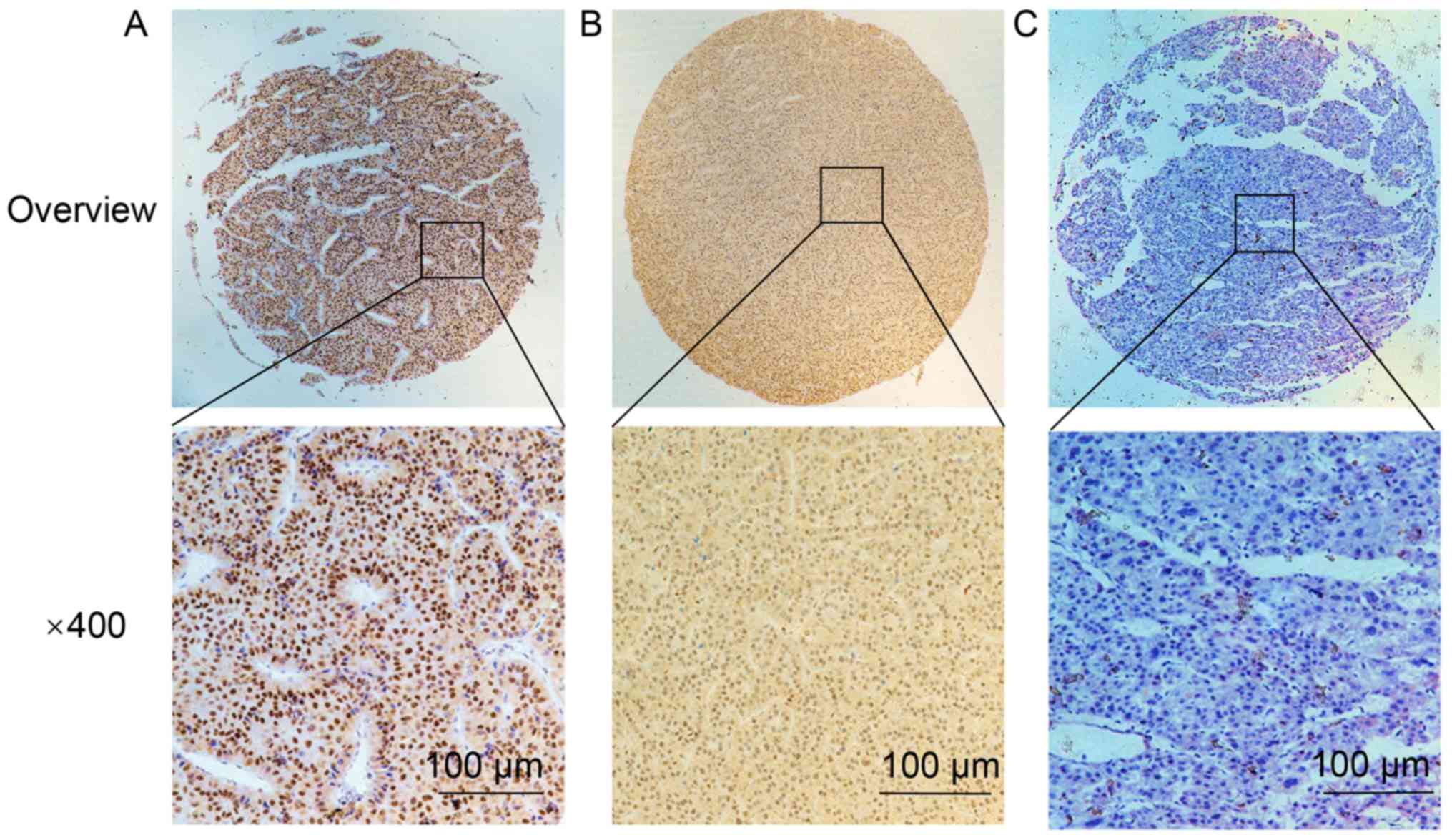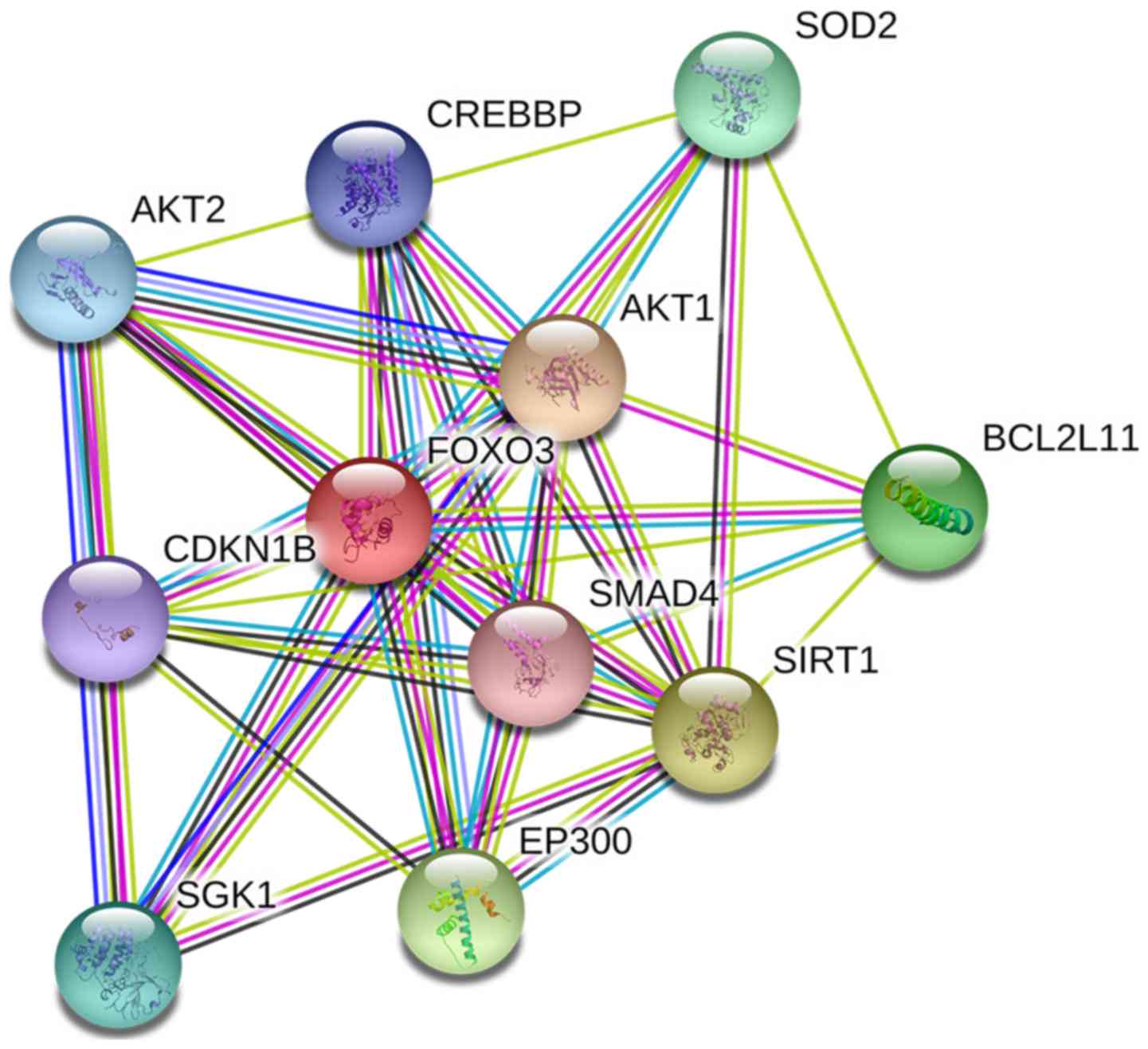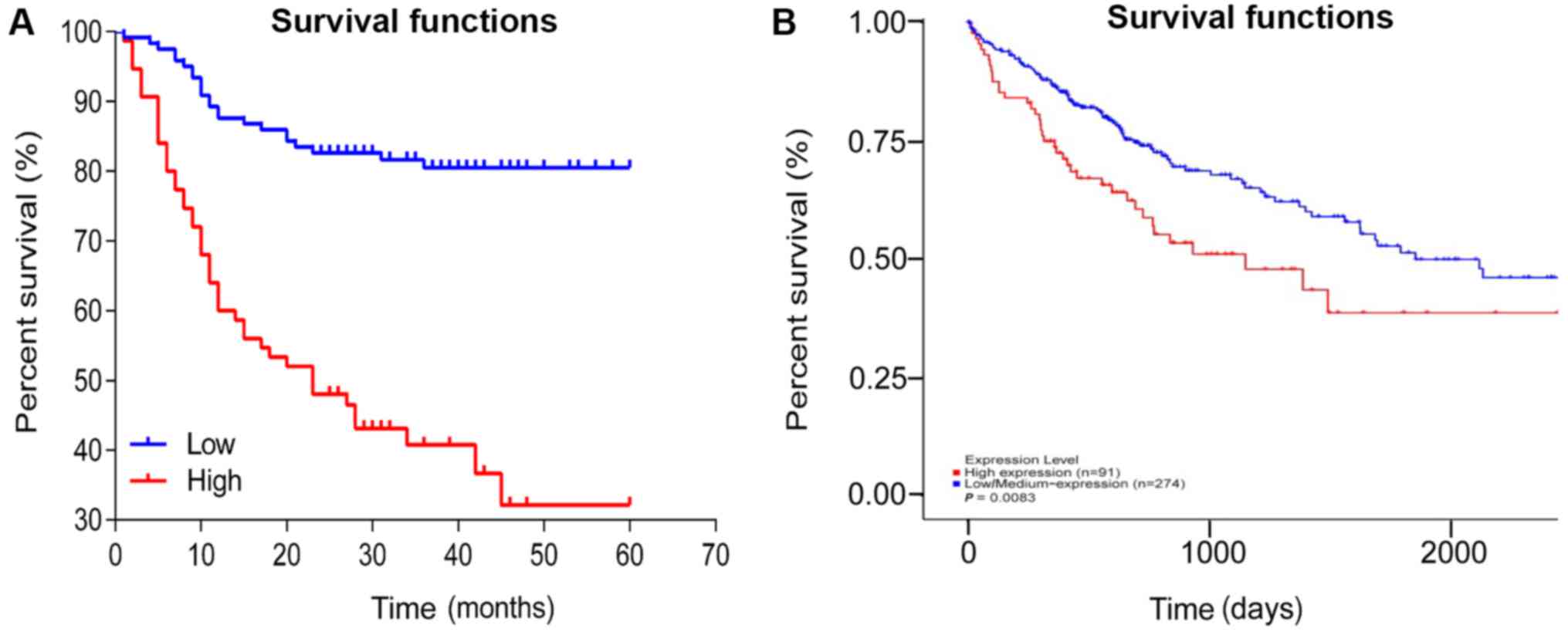|
1
|
Bray F, Ferlay J, Soerjomataram I, Siegel
RL, Torre LA and Jemal A: Global cancer statistics 2018: GLOBOCAN
estimates of incidence and mortality worldwide for 36 cancers in
185 countries. J CA Cancer J Clin. 68:394–424. 2018. View Article : Google Scholar
|
|
2
|
Global Burden of Disease Liver Cancer
Collaboration, ; Akinyemiju T, Abera S, Ahmed M, Alam N, Alemayohu
MA, Allen C, Al-Raddadi R, Alvis-Guzman N, Amoako Y, et al: The
burden of primary liver cancer and underlying etiologies from 1990
to 2015 at the global, regional, and national level: Results From
the global burden of disease study 2015. JAMA Oncol. 3:1683–1691.
2017. View Article : Google Scholar : PubMed/NCBI
|
|
3
|
National Comprehensive Cancer Network, .
NCCN clinical practice guidelines in oncology (NCCN guidelines):
Hepatobiliary cancers (version 2.2016). 2016, https://www.nccn.org/about/news/ebulletin/ebulletindetail.aspx?ebulletinid=1085June
27–2016
|
|
4
|
Keating GM: Sorafenib: A review in
hepatocellular carcinoma. Target Oncol. 12:243–253. 2017.
View Article : Google Scholar : PubMed/NCBI
|
|
5
|
Samji H, Yu A, Kuo M, Alavi M, Woods R,
Alvarez M, Dore GJ, Tyndall M, Krajden M and Janjua NZ; BC
Hepatitis Testers Cohort Team, : Late hepatitis B and C diagnosis
in relation to disease decompensation and hepatocellular carcinoma
development. J Hepatol. 67:909–917. 2017. View Article : Google Scholar : PubMed/NCBI
|
|
6
|
Ang C, O'Reilly EM and Abou-Alfa GK:
Targeted agents and systemic therapy in hepatocellular carcinoma.
Recent Results Cancer Res. 190:225–246. 2013. View Article : Google Scholar : PubMed/NCBI
|
|
7
|
Xue F, Liu Y, Chu H, Wen Y, Yan L, Tang Q,
Xiao E, Zhang D and Zhang H: eIF5A2 is an alternative pathway for
cell proliferation in cetuximab-treated epithelial hepatocellular
carcinoma. Am J Transl Res. 8:4670–4681. 2016.PubMed/NCBI
|
|
8
|
Liu Y, Ao X, Ding W, Ponnusamy M, Wu W,
Hao X, Yu W, Wang Y, Li P and Wang J: Critical role of FOXO3a in
carcinogenesis. Mol Cancer. 17:1042018. View Article : Google Scholar : PubMed/NCBI
|
|
9
|
Burgering BM: A brief introduction to
FOXOlogy. Oncogene. 27:2258–2262. 2008. View Article : Google Scholar : PubMed/NCBI
|
|
10
|
Wang PS, Chou CH, Lin CH, Yao YC, Cheng
HC, Li HY, Chuang YC, Yang CN, Ger LP, Chen YC, et al: A novel long
non-coding RNA linc-ZNF469-3 promotes lung metastasis through
miR-574-5p-ZEB1 axis in triple negative breast cancer. Oncogene.
37:4662–4678. 2018. View Article : Google Scholar : PubMed/NCBI
|
|
11
|
Tikhanovich I, Cox J and Weinman SA:
Forkhead box class O transcription factors in liver function and
disease. J Gastroenterol Hepatol. 28 (Suppl 1):S125–S131. 2013.
View Article : Google Scholar
|
|
12
|
Zhang K, Li L, Qi Y, Zhu X, Gan B, DePinho
RA, Averitt T and Guo S: Hepatic suppression of Foxo1 and Foxo3
causes hypoglycemia and hyperlipidemia in mice. Endocrinology.
153:631–646. 2012. View Article : Google Scholar : PubMed/NCBI
|
|
13
|
Tao R, Wei D, Gao H, Liu Y, DePinho RA and
Dong XC: Hepatic FoxOs regulate lipid metabolism via modulation of
expression of the nicotinamide Phosphoribosyltransferase gene. J
Biol Chem. 286:14681–14690. 2011. View Article : Google Scholar : PubMed/NCBI
|
|
14
|
Zanella F, Rosado A, García B, Carnero A
and Link W: Chemical genetic analysis of FOXO nuclear-cytoplasmic
shuttling by using image-based cell screening. Chem Biochem.
9:2229–2237. 2008.
|
|
15
|
Anderson MJ, Viars CS, Czekay S, Cavenee
WK and Arden KC: Cloning and characterization of three human
forkhead genes that comprise an FKHR-like gene subfamily. Genomics.
47:187–199. 1998. View Article : Google Scholar : PubMed/NCBI
|
|
16
|
Birkenkamp KU and Coffer PJ: FOXO
transcription factors as regulators of immune homeostasis:
Molecules to die for? J Immunol. 171:1623–1629. 2003. View Article : Google Scholar : PubMed/NCBI
|
|
17
|
Burgering BM and Kops GJ: Cell cycle and
death control: Long live Forkheads. Trends Biochem Sci. 27:352–360.
2002. View Article : Google Scholar : PubMed/NCBI
|
|
18
|
Greer EL and Brunet A: FOXO transcription
factors at the interface between longevity and tumor suppression.
Oncogene. 24:7410–7425. 2005. View Article : Google Scholar : PubMed/NCBI
|
|
19
|
Hu MC, Lee DF, Xia W, Golfman LS, Ou-Yang
F, Yang JY, Zou Y, Bao S, Hanada N, Saso H, et al: IkappaB kinase
promotes tumorigenesis through inhibition of forkhead FOXO3a. Cell.
117:225–237. 2004. View Article : Google Scholar : PubMed/NCBI
|
|
20
|
van der Vos KE, Gomez-Puerto C and Coffer
PJ: Regulation of autophagy by Forkhead box (FOX) O transcription
factors. Adv Biol Regul. 52:122–136. 2012. View Article : Google Scholar : PubMed/NCBI
|
|
21
|
Wang YQ, Cao Q, Wang F, Huang LY, Sang TT,
Liu F and Chen SY: SIRT1 protects against oxidative stress-induced
endothelial progenitor cells apoptosis by inhibiting FOXO3a via
FOXO3a ubiquitination and degradation. Cell Physiol. 230:2098–2107.
2015. View Article : Google Scholar
|
|
22
|
Lu YF, Yu JR, Yang Z, Zhu GX, Gao P, Wang
H, Chen SY, Zhang J, Liu MY, Niu Y, et al: Promoter hypomethylation
mediated upregulation of MicroRNA-10b-3p targets FOXO3 to promote
the progression of esophageal squamous cell carcinoma (ESCC). J Exp
Clin Cancer Res. 37:3012018. View Article : Google Scholar : PubMed/NCBI
|
|
23
|
Bullock MD, Bruce A, Sreekumar R, Curtis
N, Cheung T, Reading I, Primrose JN, Ottensmeier C, Packham GK,
Thomas G and Mirnezami AH: FOXO3 expression during colorectal
cancer progression: Biomarker potential reflects a tumour
suppressor role. Br J Cancer. 109:387–394. 2013. View Article : Google Scholar : PubMed/NCBI
|
|
24
|
Rehman A, Kim Y, Kim H, Sim J, Ahn H,
Chung MS, Shin SJ and Jang K: FOXO3a expression is associated with
lymph node metastasis and poor disease-free survival in
triple-negative breast cancer. J Clin Pathol. 71:806–813. 2018.
View Article : Google Scholar : PubMed/NCBI
|
|
25
|
Qian Z, Ren L, Wu D, Yang X, Zhou Z, Nie
Q, Jiang G, Xue S, Weng W, Qiu Y and Lin Y: Overexpression of
FoxO3a is associated with glioblastoma progression and predicts
poor patient prognosis. Int J Cancer. 140:2792–2804. 2017.
View Article : Google Scholar : PubMed/NCBI
|
|
26
|
Yu S, Yu Y, Sun Y, Wang X, Luo R, Zhao N,
Zhang W, Li Q, Cui Y, Wang Y, et al: Activation of FOXO3a suggests
good prognosis of patients with radically resected gastric cancer.
Int J Clin Exp Pathol. 8:2963–2970. 2015.PubMed/NCBI
|
|
27
|
Shi J, Zhang L, Shen A, Zhang J, Wang Y,
Zhao Y, Zou L, Ke Q, He F, Wang P, et al: Clinical and biological
significance of forkhead class box O 3a expression in glioma:
Mediation of glioma malignancy by transcriptional regulation of
p27kip1. J Neurooncol. 98:57–69. 2010. View Article : Google Scholar : PubMed/NCBI
|
|
28
|
Fei M, Zhao Y, Wang Y, Lu M, Cheng C,
Huang X, Zhang D, Lu J, He S and Shen A: Low expression of Foxo3a
is associated with poor prognosis in ovarian cancer patients.
Cancer Invest. 27:52–59. 2009. View Article : Google Scholar : PubMed/NCBI
|
|
29
|
Liver including intrahepatic bile ducts.
Manual for Staging of Cancer. Beahrs OH, Henson DE, Hulter RVP and
Meyers MH: JB Lippincott; Philadelphia, PA: pp. 87–92. 1988
|
|
30
|
Izumi R, Shimizu K, li T, Yagi M, Matsui
O, Nonomura A and Miyazaki I: Prognostic factors of hepatocellular
carcinoma in patients undergoing hepatic resection.
Gastroenterology. 106:720–727. 1994. View Article : Google Scholar : PubMed/NCBI
|
|
31
|
Edmondson HA and Steiner PE: Primary
carcinoma of the liver: A study of 100 cases among 48,900
necropsies. Cancer. 7:462–503. 1954. View Article : Google Scholar : PubMed/NCBI
|
|
32
|
Zhou L, Rui JA, Zhou WX, Wang SB, Chen SG
and Qu Q: Edmondson-Steiner grading: A crucial predictor of
recurrence and survival in hepatocellular carcinoma without
microvascular invasion. Pathol Res Pract. 213:824–830. 2017.
View Article : Google Scholar : PubMed/NCBI
|
|
33
|
Chen W, Zheng R, Baade PD, Zhang S, Zeng
H, Bray F, Jemal A, Yu XQ and He J: Cancer statistics in China,
2015. CA Cancer J Clin. 66:115–132. 2016. View Article : Google Scholar : PubMed/NCBI
|
|
34
|
Toyoda H, Kumada T and Tada T: Changes in
patient backgrounds may increase the incidence of HCC after SVR in
the era of IFN-free therapy for HCV. Hepatology. 64:1818–1819.
2016. View Article : Google Scholar : PubMed/NCBI
|
|
35
|
Bosch FX, Ribes J, Díaz M and Cléries R:
Primary liver cancer: Worldwide incidence and trends.
Gastroenterology. 127 (Suppl 1):S5–S16. 2004. View Article : Google Scholar : PubMed/NCBI
|
|
36
|
Galun D, Basaric D, Zuvela M, Bulajic P,
Bogdanovic A, Bidzic N and Milicevic M: Hepatocellular carcinoma:
From clinical practice to evidence-based treatment protocols. World
J Hepatol. 7:2274–2291. 2015. View Article : Google Scholar : PubMed/NCBI
|
|
37
|
He TC, Zhou S, da Costa LT, Yu J, Kinzler
KW and Vogelstein B: A simplified system for generating recombinant
adenoviruses. Proc Natl Acad Sci USA. 95:2509–2514. 1998.
View Article : Google Scholar : PubMed/NCBI
|
|
38
|
Zhang J, Yang PL and Gray NS: Targeting
cancer with small molecule kinase inhibitors. Nat Rev Cancer.
9:28–39. 2009. View Article : Google Scholar : PubMed/NCBI
|
|
39
|
Hojjat-Farsangi M: Small-molecule
inhibitors of the receptor tyrosine kinases: Promising tools for
targeted cancer therapies. Int J Mol Sci. 15:13768–13801. 2014.
View Article : Google Scholar : PubMed/NCBI
|
|
40
|
Verweij J, Casali PG, Zalcberg J, LeCesne
A, Reichardt P, Blay JY, Issels R, van Oosterom A, Hogendoorn PC,
Van Glabbeke M, et al: Progression-free survival in
gastrointestinal stromal tumours with high-dose imatinib:
Randomized trial. Lancet. 364:1127–1134. 2004. View Article : Google Scholar : PubMed/NCBI
|
|
41
|
Rimassa L, Danesi R, Pressiani T and Merle
P: Management of adverse events associated with tyrosine kinase
inhibitors: Improving outcomes for patients with hepatocellular
carcinoma. Cancer Treat Rev. 77:20–28. 2019. View Article : Google Scholar : PubMed/NCBI
|
|
42
|
Tsai KL, Sun YJ, Huang CY, Yang JY, Huang
MC and Hsiao CD: Crystal structure of the human FOXO3a-DBD/DNA
complex suggests the effects post-translational modification.
Nucleic Acids Res. 35:6984–6994. 2007. View Article : Google Scholar : PubMed/NCBI
|
|
43
|
Zou Y, Tsai WB, Cheng CJ, Hsu C, Chung YM,
Li PC, Lin SH and Hu MC: Forkhead box transcription factor FOXO3a
suppresses estrogen-dependent breast cancer cell proliferation and
tumorigenesis. Breast Cancer Res. 10:R212008. View Article : Google Scholar : PubMed/NCBI
|
|
44
|
Wang F, Marshall CB, Yamamoto K, Li GY,
Plevin MJ, You H, Mak TW and Ikura M: Biochemical and structural
characterization of an intramolecular interaction in FOXO3a and its
binding with p53. J Mol Biol. 384:590–603. 2008. View Article : Google Scholar : PubMed/NCBI
|
|
45
|
Luo J, Liang A, Liang M, Xia R, Rizvi Y,
Wang Y and Cheng J: Serum glucocorticoid-regulated kinase 1 blocks
CKD-induced muscle wasting via inactivation of FOXO3a and Smad2/3.
J Am Soc Nephrol. 27:2797–2808. 2016. View Article : Google Scholar : PubMed/NCBI
|
|
46
|
Lu J, Zhang R, Hong H, Yang Z, Sun D, Sun
S, Guo X, Ye J, Li Z and Liu P: The poly(ADP-ribosyl) ation of
FOXO3 mediated by PA R P1 participates in isoproterenol-induced
cardiac hypertrophy. J Biochim Biophys Acta. 1863:3027–3039. 2016.
View Article : Google Scholar
|
|
47
|
Sanchez AM, Csibi A, Raibon A, Cornille K,
Gay S, Bernardi H and Candau R: AMPK promotes skeletal muscle
autophagy through activation of forkhead FOXO3a and interaction
with UIK2. J Cell Biochem. 113:695–710. 2012. View Article : Google Scholar : PubMed/NCBI
|
|
48
|
van Grevenynghe J, Cubas RA, DaFonseca S,
Metcalf T, Tremblay CL, Trautmann L, Sekaly RP, Schatzle J and
Haddad EK: Foxo3a: An integrator of immune dysfunction during HIV
infection. Cytokine Growth Factor Rev. 23:215–221. 2012. View Article : Google Scholar : PubMed/NCBI
|
|
49
|
Ikeda J, Tian T, Wang Y, Hori Y, Honma K,
Wada N and Morii E: Expression of FoxO3a in clinical cases of
malignant lymphoma. Pathol Res Pract. 209:716–720. 2013. View Article : Google Scholar : PubMed/NCBI
|
|
50
|
Shou Z, Lin L, Liang J, Li JL and Chen HY:
Expression and prognosis of FOXO3a and HIF-1α in nasopharyngeal
carcinoma. J Cancer Res Clin Oncol. 138:585–593. 2012. View Article : Google Scholar : PubMed/NCBI
|
|
51
|
Lu M, Xiang J, Xu F, Wang Y, Yin Y and
Chen D: The expression and significance of pThr32-FOXO3a in human
ovarian cancer. Med Oncol. 29:1258–1264. 2012. View Article : Google Scholar : PubMed/NCBI
|
|
52
|
Stan SD, Hahm ER, Warin R and Singh SV:
Withaferin A causes FOXO3a- and Bim-dependent apoptosis and
inhibits growth of human breast cancer cells in vivo. Cancer Res.
68:7661–7669. 2008. View Article : Google Scholar : PubMed/NCBI
|
|
53
|
Kim HJ, Lee SY, Kim CY, Kim YH, Ju W and
Kim SC: Subcellular localization of FOXO3a as a potential biomarker
of response to combined treatment with inhibitors of PI3K and
autophagy in PIK3CA-mutant cancer cells. Oncotarget. 8:6608–6622.
2017.PubMed/NCBI
|
|
54
|
Eijkelenboom A and Burgering BM: FOXOs:
Signaling integrators for homeostasis maintenance. Nat Rev Mol Cell
Biol. 14:83–97. 2013. View Article : Google Scholar : PubMed/NCBI
|
|
55
|
Jia Q, Bu Y, Wang Z, Chen B, Zhang Q, Yu S
and Liu Q: Maintenance of stemness is associated with the
interation of LRP6 and heparin-binding protein CCN2 autocrined by
hepatocellular carcinoma. J Exp Clin Cancer Res. 36:1172017.
View Article : Google Scholar : PubMed/NCBI
|
|
56
|
You H, Yamamoto K and Mak TW: Regulation
of transactivation-independent proapoptotic activity of p53 by
FOXO3a. Proc Natl Acad Sci USA. 103:9051–9056. 2006. View Article : Google Scholar : PubMed/NCBI
|
|
57
|
Kloet DE and Burgering BM: The PKB/FOXO
switch in aging and cancer. Biochim Biophys Acta. 1813:1926–1937.
2011. View Article : Google Scholar : PubMed/NCBI
|
|
58
|
Hoogeboom D and Burgering BM: Should I
stay or should I go: Beta-catenin decides under stress. Biochim
Biophys Acta. 1796:63–74. 2009.PubMed/NCBI
|
|
59
|
Essers MA, de Vries-Smits LM, Barker N,
Polderman PE, Burgering BM and Korswagen HC: Functional interaction
between beta-catenin and FOXO in oxidative stress signaling.
Science. 308:1181–1184. 2005. View Article : Google Scholar : PubMed/NCBI
|
|
60
|
Lasagna N, Fantappiè O, Solazzo M,
Morbidelli L, Marchetti S, Cipriani G, Ziche M and Mazzanti R:
Hepatocyte growth factor and inducible nitric oxide synthase are
involved in multidrug resistance-induced angiogenesis in
hepatocellular carcinoma cell lines. Cancer Res. 66:2673–2682.
2006. View Article : Google Scholar : PubMed/NCBI
|


















